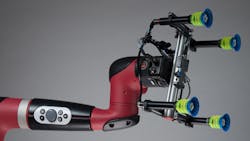Welcome on in to The Tech Column, a new feature here at IndustryWeek that we hope will catch you up on some of the major news of the week from around manufacturing and technology. Trends, products, notes and quotes, a tweet or two, maybe even some gossip (OK, probably not much gossip … probably not any gossip, ever) — it will all be here, on the site by Friday morning and over in the Manufacturing Technology newsletter.
Up first this week, Rethink Robotics, the Massachusetts industrial robot maker that has been a favorite for years because of its approachability and ease of use. Baxter and Sawyer aren’t the strongest robots on the floor, but they might be the quickest to program — and now they can do a little more.
On Thursday, Rethink introduced its ClickSmart series, a set of end-of-arm gripper kit tools that incorporate “smart sensing and rapid swapping capabilities.” I haven’t had a chance to look at these in person yet, but the ability of being able to swap out five different gripper kits — large pneumatic, small pneumatic, large vacuum, small vacuum and foam vacuum — sounds appealing. So does the embedded sensing, gripper recognition and access to actuators and sensors the series includes.
The kits will allow users “to deploy robots faster, more intelligently, in more tasks and applications, and without any time-consuming customization,” according to Rethink president and CEO Scott Eckert, who added that this is the first “single-source solution for fully integrated deployments.”
This seems like the next logical step for a company that has opened up industrial robotics to companies that had never before considered a fleet of robots, or that didn’t have the staff to program them. Rethink makes things easy (heck, a couple years back, even I was able to program some movements on a Baxter in minutes, and I never took one engineering class). These plates seem to make things even easier.
AUGMENTED REALITY, PART 1: I dived into augmented reality for a story earlier this year and learned more about the tech in general (if only the general public could see beyond the 2016 fad of Pokemon GO) and some impressive companies, in particular. One of those companies was Vuzix, which is among the leaders right now in industrial smart glasses.
The Rochester-headquartered company enjoyed a big Wednesday, first thanks to an Accenture story about how the company worked with Airbus to help the plane manufacturer help “operators reduce the complexity of assembling cabin seats and decrease the time required to complete this task” by “developing a state-of-the-art application for wearables … to improve the accuracy and reduce the complexity of cabin furnishing.” This is reportedly the first industrialized use of wearable tech on the final assembly line for a major aircraft manufacturer.
The second bit of Wednesday news for Vuzix was, in advance of the start of Hannover Messe this weekend, a partnership with three more European app developers: Finnish Augumenta, Italian Brochesia and German DOSCO. The move should afford Vuzix, which already has offices in Oxford in the United Kingdom, a bigger footprint in Europe.
ROBOT OF THE WEEK: Robots are different in Japan than they are here, of course. We want our robots strong, productive and — maybe — able to help around the house. Across the Pacific, robots as companions, even friends, are far more common. The new Musio X and B, which officially hit the market Tuesday and is already sold out (for now) is both friendly and productive. Why? Because the social robot uses software and AI to teach English.
“We listened to our supporters and customers, and realized what they want in Musio is personalized diagnosis and rich educational content for users in every learning stage,” AKA LLC chief strategy officer Brian Lee said. When the robot is available again, it will run from 98,000 yen to 128,000 yen — about $900 to about $1,200 — with a monthly AI service plan starting at about $9. Now … where’s the robot that will teach me Japanese?
AUGMENTED REALITY, PART 2: Another player in the AR space has enjoyed a good month, too. Upskill, which recently changed its name from APX Labs, announced it had secured Series B funding from two of its largest customers — Boeing and GE Ventures — along with some other previous investors.
Steve Norlund, VP for Boeing’s new HorizonX, said funding Upskill “was a priority investment” that “puts into action our desire to harness innovative technology to drive efficiency, reduce cost and improve quality in our manufacturing.”
GE, meanwhile, has recorded several significant efficiency increases thanks to the Upskill Skylight software platform — a 46% increase in warehouse worker productivity during a first-time use at a GE Healthcare MRI manufacturing facility, a 34% productivity improvement notched by a technician installing wiring into wind turbine top boxes — and is deploying the software in seven different business units.
Upskill cites an average performance improvement of 32% among its industrial workforce customers.
QUOTE OF THE WEEK: “If you take one thing away with you from today, (it’s that) we’re making the camera the first augmented-reality platform.” — Facebook CEO Mark Zuckerberg, Tuesday, during the Facebook F8 Developers Conference keynote.
As Molly McHugh explains over on The Ringer, Zuck is throwing some serious shade here at Snapchat, the photo app giant he once tried to buy for $3 billion and now wants to pretty much wipe out with an ongoing cold war of photo filters and 3-D renderings. Zuckerberg has a lot going on right now, including his (not-really-political-campaign) tour of the country, but this battle could escalate in the months to come, and it could have some significant effect on AR — industrial and otherwise.
About the Author
Matt LaWell
Staff Writer
Staff writer Matt LaWell explores news in manufacturing technology, covering the trends and developments in automation, robotics, digital tools and emerging technologies. He also reports on the best practices of the most successful high tech companies, including computer, electronics, and industrial machinery and equipment manufacturers.
Matt joined IndustryWeek in 2015 after six years at newspapers and magazines in West Virginia, North Carolina and Ohio, a season on the road with his wife writing about America and minor league baseball, and three years running a small business. He received his bachelor's degree in magazine journalism from Ohio University.

